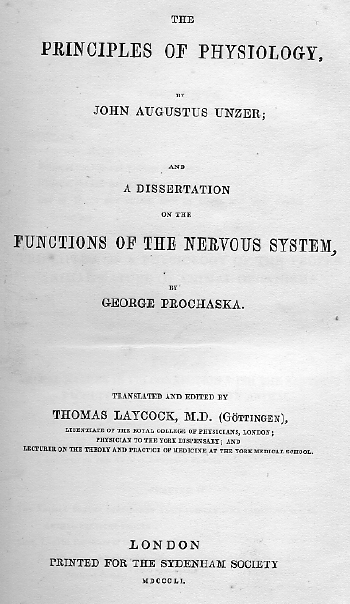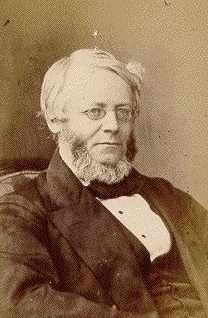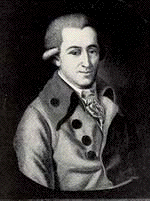- The Instinct for Repose and Exhilaration.
pages 153-155
-
- The animal-sentient forces are exhausted by
long activity, and the destruction of the animal
would result therefrom if nature had not
previously provided against this cause of
exhaustion. When the animal-sentient forces
(that is to say, the forces of the material
ideas, as they may be now considered, in so far
as they cause conceptions or sentient actions,)
have been uninterruptedly used by the animal for
so long a time that any further effort would be
injurious, it feels during thought or during the
performance of the sentient actions in the body
an unpleasant difficulty, which has been termed
lassitude, weariness, or fatigue. This
unpleasant sensation is the natural stimulus of
the instinct for repose or sleep, which instinct
consists in an effort to develop the contrary to
this unpleasant sensation, that is, the
withdrawal of the mind from the wearying
thoughts, and letting the animal-sentient forces
be inactive, so as to experience the sweetness
of repose, and thereby collect new forces, as is
the design of the Creator in the instinct and
its object with the animal, although the latter
knows nothing of the actual intent, namely, the
renewal of the strength. Everything which causes
the unpleasant sensation of lassitude develops
the sensational stimulus for repose, and the
instinct itself, the longing for repose. Causes
of this kind are hardships, every long-continued
movement, meditation, and all longcontinued
thought, attention, reflection, and abstraction;
also articles of food, or medicines, which
interrupt the animal-sentient forces, as wine,
opium, heavy meals, pressure in or upon the
brain, the plethoric state, various poisons, and
numerous others.
-
- The sensational stimulus, namely, the
disagreeable external sensation of weariness,
manifests its sentient action in the cardiac and
respiratory movements, which are at first
languid almost to faintness; but in a higher
degree the stimulus becomes feverish, and these
actions become contra-natural (See also
Haller 'Physiology,'
). In so far as the sensational stimulus is a
foreseeing of the future sweet repose (the
contrary to the disagreeable feeling of
lassitude), it manifests its sentient actions in
the parts appropriated to the animal-sentient
forces, so that it develops imperfectly the
future state of repose; and in fact, in the
straining of the animal-sentient forces and the
effort of the mind to withdraw as much as
possible from all external sensations, and
spontaneous conceptions, and thereby to
interrupt all their sentient actions in the
body, consists the sentient actions of the
instinct to repose itself, so that the organs
which cooperate in the act of thinking, and
which produce sentient actions, are compelled
involuntarily, by the soul and by a purely
corporeal process, to cease their function.
Consequently, during the instinct to repose and
sleep, the external sensations derived from
external impressions, and from the spontaneous
conceptions are gradually lost, in consequence
of the enfeebling of their material ideas in the
brain; the muscles, in so far as they perform
sentient actions, move heavily, and let the
limbs sink; the eyelids shut, and the whole body
totters. In short, the instinct induces
imperfectly that condition which comes on when
the instinct is satisfied by rest or sleep, and
there results from the connection between the
physical, mechanical, and animal forces, the
repose and renewal of the forces appropriate to
sentient actions, in accordance with the object
of nature in establishing the instinct (vide
Haller's
'Physiology').
-
- Yawning and
stretching are rather sentient
actions of the instinct for exhilaration, than
for rest. For when we feel the unpleasant
condition of languor and weariness, we can
attain its opposite by new efforts of the
animal-sentient forces, as well as by their
periodical relaxation during sleep. If,
therefore, the obscure stimulus leads us to the
former, we then express the anticipated
condition of renewed activity of the
animal-sentient forces, by imperfect efforts, to
which the agreeable obscure foreseeing of the
condition of activity excites us. Consequently,
although these movements are doubtless signs of
weariness, and of the need for sleep, yet they
are not sentient actions of the instinct for
sleep, but of the instinct for activity, or the
waking state. All circumstances that excite the
obscure foreseeing of pleasing exhilaration,
and, consequently, the above-mentioned causes of
weariness render the instinct active, if we
desire the antagonistic condition, namely
exhilarated activity. Now, as the sight of
another person who yawns or stretches himself,
reminds us of this condition antagonistic to
disagreeable weariness, it leads us to the
instinct for exhilaration, and we stretch and
yawn with the person.
-
- It still remains to state specially, with
reference to the instinct for repose, that the
physical and mechanical forces of the machines
of animal bodies, as also the vis nervosa on
which nerve-actions are dependent, in so far as
they are not also at the same time sentient
actions, are not subject to this law of nature,
namely, that their uninterrupted activity shall
cause unpleasant external sensations, and,
consequently, induce the stimuli of the instinct
for repose and sleep. The formation of the
blood, and its continuous internal movement,
together with its circulation; the working of
the elasticity and other purely physical and
mechanical forces of the machines; nay, all
those processes of the mechanical machines which
during the waking state are sentient actions,
but at the same time may be and commonly are,
even during the waking state, purely
nerveactions, as, for example, the movements of
the heart, stomach, intestines, and various
muscles, particularly the muscles of
respiration, all these, as such, are never
accompanied by a sensation of fatigue, never
excite the instinct for repose, never stand in
need of repose, are never changed by this
instinct, nor directly by its satisfaction
during the deepest sleep, but go on
continuously, and take no further part in it
unless they are at the same time sentient
actions, or indirectly influenced through the
general connection of all the forces of the
animal (Haller's
'Physiology'). On these principles, all the
phenomena of the animal economy, which depend
upon the sensational stimulus to sleep, on the
instinct itself, and on the satisfaction of the
instinct, or the act of sleeping, may be very
readily explained.
-
 - A short history of neurology, the bristish
contribution.
- F. Clifford Rose
- Butterworth Heinman Ed, Oxford1999.
-
- Thomas Laycock (1812-1876 and the 'Reflexe
cerebral action' p146-147
 - Thomas Laycock (1812-1876) a
physician from York, was 'the first to
formulate' reflex action of the brain, in 1844,
according to the Dictionary of National
Biography . However, in 1851 he translated J.A.
Unzer's Principles of Physiology from the
German, together with G. Prochaska's
Dissertation on the Functions of the Nervous
System from the original Latin (Laycock,
1851).
-
- In 1771,
Johann
August Unzer, 1727-1799, wrote his Erste
Gründe einer Physiologie der eigentlichen
thierischen Natur thierischer Korper -
Principles of a Physiology of the Proper Animal
Nature of Animal Bodies. He held that reflex
action, as described by Willis, was the
functional principle of the nervous system, and
that many separate pathways could be followed by
careful preparation of brains, something exotic
for the sceptic Albrecht von Haller who thought
that Unzer was indulging in fantastic dreams.
Unzer, in Halle, adhered to the Animist school
of Stahl and Juncker which, contrary to the
Leibnizian views of Boerhaave and Haller,
believed in direct causal interaction of body
and soul.
-
- The other one of Laycock's authors,
George Prochaska, 1749-1820, was a Vitalist
with similar convictions, who also felt a need
to account for the many unconscious functions of
the brain. This Viennese professor of anatomy
and ophthalmology wrote De Usu et Functione
Systematis Nervorum (Prochaska, 1800). He
concluded that the sensorium commune (the spinal
cord, the medulla oblongata and the basal
ganglia) reflects the sensorial impressions into
motor by definite laws peculiar to itself, and
independently of consciousness.
-
- Thus Unzer's and Prochaska's work which
Laycock probably knew from the time of his
German studies, and of which he knew every
single word from his own translation (Laycock,
1851), contained much earlier 'formulations' of
reflex action of the brain than Laycock's own
work. The reflex theories of both authors can be
traced back to Thomas Willis (1621-1675) whose
work had been rather neglected in eighteenth
century Britain because it was so much more
complicated than the simplifications of his
contemporary, Sydenham. Laycock's renewal of
Unzer's and Prochaska's reflex theories meant
that Willis's disparaged ideas returned to
Britain after a detour through German
lands.
-
-

- George Prochaska,
1749-1820
-
- Les
biographies de
neurologues
|



